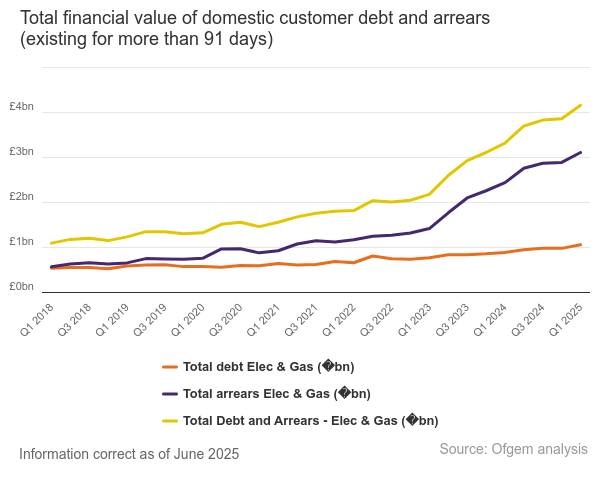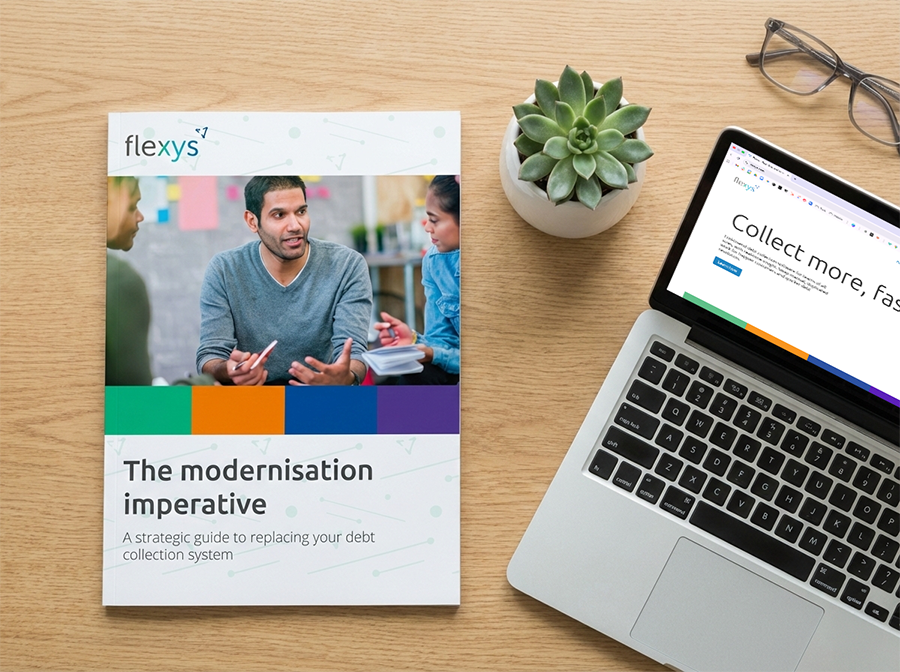How can the energy sector tackle its £4bn consumer debt crisis?
The UK's energy sector is facing a staggering mountain of consumer debt. As households continue to grapple with financial pressures, energy bills remain a significant burden, driving a dramatic rise in debt debt and customer arrears in the energy sector.
The scale of this problem has been laid bare by figures from the energy regulator, Ofgem, which show total household energy debt has soared past a record £4 billion.

The alarming numbers: Ofgem data reveals a £4 billion debt crisis
The Ofgem data paints a stark picture. In early 2025, total energy debt was 25% higher than the year before, after rising 8% in just the last three months.
The real story, however, lies in the details:
- The unmanaged debt chasm: The most concerning trend is the number of customers in arrears without a repayment plan. The average debt for these households reached £1,712 for electricity and £1,482 for gas at the end of 2024. The total value of this unmanaged debt is now around three times greater than the debt being managed through repayment plans – a dramatic reversal from 2018, when both were of nearly equal value.
- Growing ranks of debt: Over 1 million electricity customers and 864,000 gas customers are now in arrears without a formal plan in place.
- Managed debt is also rising: Even for customers with a repayment arrangement, the average debt level is climbing. It now stands at £740 for electricity and £608 for gas, a 5% and 4% increase respectively from the previous year. The number of customers on these plans is also rising, now totalling over 840,000 for electricity and nearly 700,000 for gas.
This data highlights a critical tipping point. The problem is not just growing; it's accelerating faster than current management strategies can contain it.
The ripple effect: operational risks of rising customer arrears in the energy sector
The escalating debt crisis has serious implications for energy suppliers, reshaping the operational and financial landscape:
- The end of traditional enforcement: The long-term trend of decreasing disconnections has reached its conclusion. With zero disconnections recorded since Q1 2023, suppliers have effectively lost their ultimate tool for debt recovery. This necessitates a fundamental shift in energy debt collection strategy, moving away from enforcement and towards engagement.
- Regulatory pressure to act: Ofgem is actively encouraging suppliers to act quickly to establish debt repayment arrangements. This puts the onus on companies to be proactive, not reactive, in identifying and supporting struggling customers.
- Intensified operational strain: The sheer volume of customers falling into arrears and needing repayment plans is placing immense strain on debt management teams. This influx demands efficient and scalable collections software for utilities capable of delivering empathetic customer engagement.
- Soaring bad debt: The growth of unmanaged arrears directly translates to a higher risk of bad debt write-offs, putting pressure on suppliers' financial stability.
Next steps: a proactive strategy for managing energy debt
To tackle this problem, a decisive and strategic shift is required. Outdated approaches to managing energy debt won’t serve the needs of suppliers or customers.
What might this look like?
- Proactive intervention is paramount: With arrears far outstripping managed debt, waiting for customers to default is not an option. Suppliers must use real-time data to identify at-risk customers early and intervene with support before they fall into significant debt.
- Frictionless repayment set-up: The data shows a clear need to move customers from arrears to manageable repayment plans. Ofgem's encouragement underscores this. The process for setting up these plans must be as simple, flexible, and accessible as possible.
- Tailored and sustainable plans: Repayment plans must be genuinely affordable and tailored to individual circumstances to be sustainable in the long term, preventing a cycle of failed plans and further debt.
- Better access to wider support: Energy debt is often a symptom of wider financial hardship. Integrating with debt advice charities and providing financial wellbeing tools is essential for a sustainable solution, especially for vulnerable customer support in the energy sector.
The Ofgem figures show that it is time for energy suppliers to pivot from traditional collection methods to proactive, empathetic, and technology-enabled customer support. By doing so, they can not only mitigate their financial risk but also play a crucial role in helping their customers find a way back to financial stability.
Is your current collections operation fit for this new £4.15 billion reality? Get in touch to find out how our software can help you reduce arrears and support your customers more effectively.





